Bennett v. Bennett et al., 2025 ONSC 4756 — Guardianship, POAs, and Fiduciary Duties
Overview
In Bennett v. Bennett et al., 2025 ONSC 4756, Justice C. Gilmore of the Ontario Superior Court was asked to decide who should act as substitute decision-maker for 70-year-old Carl Bennett, a retired nurse suffering from dementia.
The case arose after Carl’s son, Donnovan, obtained Powers of Attorney for Property and Personal Care in September 2023. Carl’s wife of nearly five decades, Adassa, challenged those documents, arguing that Carl lacked capacity when he signed them and that Donnovan had breached his fiduciary duties as attorney.
The court ultimately agreed, setting aside the POAs, finding multiple breaches of duty, and appointing Adassa as Guardian of both Property and Person.
The Facts
Carl and Adassa had been married for 49 years, often dividing their time between Jamaica and Toronto. In early 2023, Carl’s health began to decline following a stroke, and he was diagnosed with dementia and memory loss. In September of that year, Donnovan removed Carl from his daughter’s home under questionable circumstances and within days arranged for him to sign POAs granting Donnovan sweeping authority.
From that point forward, Adassa and Carl’s other children were largely cut off. They were unable to see Carl for nearly a year, had to resort to court motions to regain access, and even then found surveillance cameras installed in his room at a retirement residence. Meanwhile, Donnovan managed Carl’s finances, withdrew funds from joint accounts, and left his father with debts he had not previously carried. Throughout this period, Carl expressed to independent counsel that he wanted Adassa—not Donnovan—to make decisions for him, and that he wished to return to Jamaica.
The Law
The case turned on two key areas of the Substitute Decisions Act, 1992 (“SDA”). First, the court considered the test for granting a Power of Attorney. Section 8 requires that the person understand their property, obligations to dependants, the scope of authority being granted, and the risks of mismanagement.
Second, the court reviewed the duties of an attorney or guardian. For property, attorneys must manage assets for the incapable person’s benefit, keep proper accounts, and act with honesty and diligence. For personal care, they must respect the person’s wishes, encourage participation in decisions, consult family members, and foster supportive relationships. Courts also apply principles from undue influence cases, looking at whether there were suspicious circumstances around the signing of legal instruments, especially when a beneficiary orchestrates the process.
Analysis
Justice Gilmore found that Carl’s capacity was already in serious question by early 2023, when his doctor noted “rapid memory deterioration.” By the fall of that year, medical professionals and even Donnovan himself were acknowledging that Carl suffered from dementia and required round-the-clock care. Although no direct medical assessment was made on the day Carl signed the POAs, the surrounding evidence pointed strongly to incapacity.
The circumstances of the execution also raised red flags. Donnovan arranged the meeting, produced dubious identification, attended the solicitor’s office with Carl, and immediately gained access to his father’s accounts. The solicitor’s file was never produced. These factors suggested undue influence and suspicious circumstances.
Even if capacity had not been in doubt, Donnovan’s conduct as attorney was deeply problematic. He cut Carl off from his wife and children, substituted limited phone contact for in-person visits, and resisted court orders that mandated access. He installed surveillance cameras, used them to monitor visits, and presented footage in court. Financially, he failed to provide a transparent accounting, allowed debts to accumulate, and ignored court costs orders. Despite Carl’s repeated wish to live with Adassa and avoid long-term care, Donnovan unilaterally pressed for institutionalization.
Justice Gilmore found that Donnovan repeatedly breached his fiduciary duties under the Substitute Decisions Act, 1992, pointing to the following conduct as clear examples of failure:
-
Callous removal from home: Donnovan removed Carl from his daughter’s house on false pretenses, without consultation or checking conditions, which police later found to be safe and comfortable.
-
Unnecessary relocations: Despite insisting that moving Carl was harmful, Donnovan moved him three times in under two years without consulting family.
-
Blocking family access: He denied Adassa and Makeshia meaningful access to Carl for over a year, forcing them to seek a court order. Even then, he insisted on supervised access and substituted phone contact, which was unreasonable given Carl’s dementia.
-
Interference with visits: Donnovan refused simple requests for contact, such as allowing Carl to hug his wife and daughter during a police wellness check, and even called police to try to stop a birthday dinner outing.
-
Surveillance and misuse of cameras: He installed cameras in Carl’s retirement home room, ignored repeated requests to remove them, and later used footage against family members in litigation.
-
Ignoring Carl’s wishes: Donnovan pressed for long-term care despite Carl’s repeated objections and left him languishing in hospital without a concrete care plan, instead of considering alternatives consistent with Carl’s wishes.
-
Unilateral decision-making: From September 2023 onward, Donnovan excluded Adassa, Makeshia, and Stephan from all decisions about Carl’s care, alienating Carl from his closest family members until forced by court order to permit access.
Against this backdrop, the court turned to who should serve as guardian. Carl had clearly expressed that he wanted Adassa in that role. She had been his spouse and caregiver for decades, was herself a trained personal support worker, and proposed a care plan that aligned with his wishes. The Public Guardian and Trustee reviewed her plan and raised no serious objections. Justice Gilmore therefore appointed Adassa as Guardian of Property and of the Person.
Lessons Learned
This decision highlights the importance of safeguarding vulnerable people when POAs are executed. Capacity assessments should be carefully documented, particularly where cognitive decline is already evident. The process must be independent, transparent, and free from the influence of those who stand to benefit.
The ruling also underscores the high fiduciary standards imposed on attorneys under the SDA. Attorneys must foster family connections, consult others, and act with transparency in financial matters. Failing to do so can lead not only to removal but also to personal costs consequences, as seen in the $40,000 award levied against Donnovan.
Finally, the case demonstrates that the wishes of the incapable person remain central. Even though Carl was no longer able to manage his affairs, his consistent preference for his wife as decision-maker guided the court’s decision. Guardianship is not simply about authority—it is about ensuring care and dignity in accordance with the person’s values and relationships.






